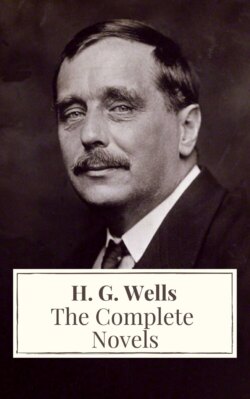Читать книгу The Complete Novels of H. G. Wells - H. G. Wells - Страница 224
На сайте Литреса книга снята с продажи.
3.
ОглавлениеAnn Veronica's first impression of Kitty Brett was that she was aggressive and disagreeable; her next that she was a person of amazing persuasive power. She was perhaps three-and-twenty, and very pink and healthy-looking, showing a great deal of white and rounded neck above her business-like but altogether feminine blouse, and a good deal of plump, gesticulating forearm out of her short sleeve. She had animated dark blue-gray eyes under her fine eyebrows, and dark brown hair that rolled back simply and effectively from her broad low forehead. And she was about as capable of intelligent argument as a runaway steam-roller. She was a trained being—trained by an implacable mother to one end.
She spoke with fluent enthusiasm. She did not so much deal with Ann Veronica's interpolations as dispose of them with quick and use-hardened repartee, and then she went on with a fine directness to sketch the case for her agitation, for that remarkable rebellion of the women that was then agitating the whole world of politics and discussion. She assumed with a kind of mesmeric force all the propositions that Ann Veronica wanted her to define.
"What do we want? What is the goal?" asked Ann Veronica.
"Freedom! Citizenship! And the way to that—the way to everything—is the Vote."
Ann Veronica said something about a general change of ideas.
"How can you change people's ideas if you have no power?" said Kitty Brett.
Ann Veronica was not ready enough to deal with that counter-stroke.
"One doesn't want to turn the whole thing into a mere sex antagonism."
"When women get justice," said Kitty Brett, "there will be no sex antagonism. None at all. Until then we mean to keep on hammering away."
"It seems to me that much of a woman's difficulties are economic."
"That will follow," said Kitty Brett—"that will follow."
She interrupted as Ann Veronica was about to speak again, with a bright contagious hopefulness. "Everything will follow," she said.
"Yes," said Ann Veronica, trying to think where they were, trying to get things plain again that had seemed plain enough in the quiet of the night.
"Nothing was ever done," Miss Brett asserted, "without a certain element of Faith. After we have got the Vote and are recognized as citizens, then we can come to all these other things."
Even in the glamour of Miss Brett's assurance it seemed to Ann Veronica that this was, after all, no more than the gospel of Miss Miniver with a new set of resonances. And like that gospel it meant something, something different from its phrases, something elusive, and yet something that in spite of the superficial incoherence of its phrasing, was largely essentially true. There was something holding women down, holding women back, and if it wasn't exactly man-made law, man-made law was an aspect of it. There was something indeed holding the whole species back from the imaginable largeness of life… .
"The Vote is the symbol of everything," said Miss Brett.
She made an abrupt personal appeal.
"Oh! please don't lose yourself in a wilderness of secondary considerations," she said. "Don't ask me to tell you all that women can do, all that women can be. There is a new life, different from the old life of dependence, possible. If only we are not divided. If only we work together. This is the one movement that brings women of different classes together for a common purpose. If you could see how it gives them souls, women who have taken things for granted, who have given themselves up altogether to pettiness and vanity… ."
"Give me something to do," said Ann Veronica, interrupting her persuasions at last. "It has been very kind of you to see me, but I don't want to sit and talk and use your time any longer. I want to do something. I want to hammer myself against all this that pens women in. I feel that I shall stifle unless I can do something—and do something soon."
